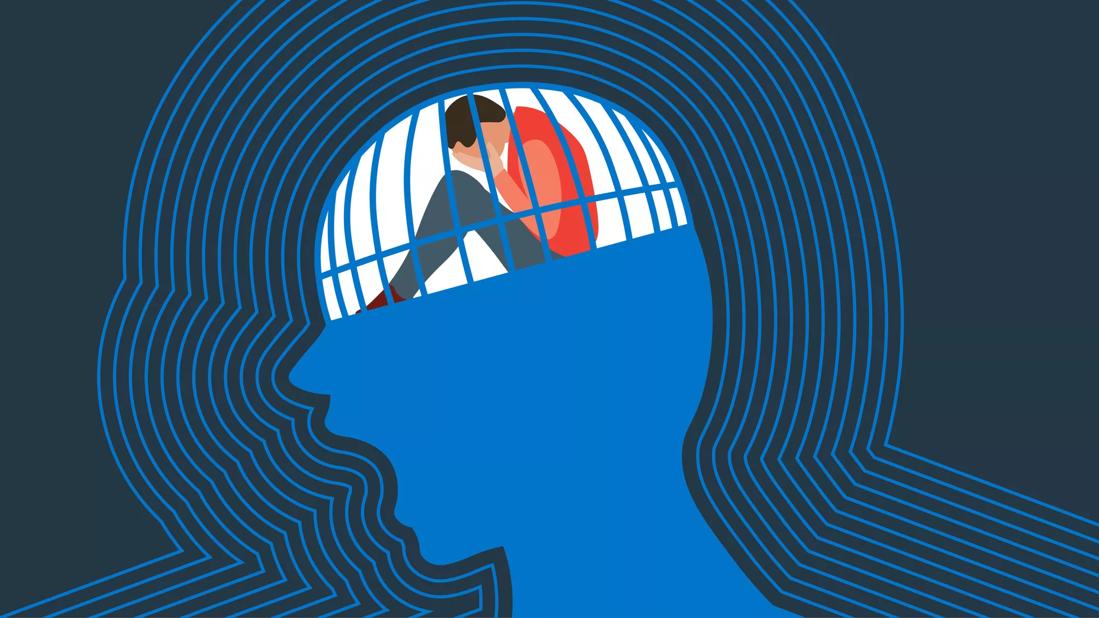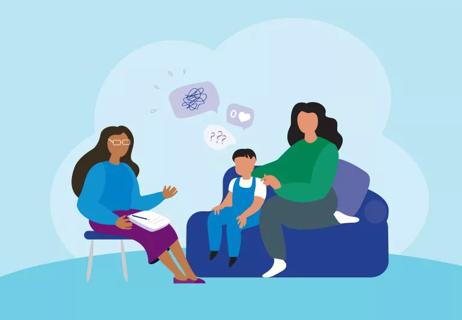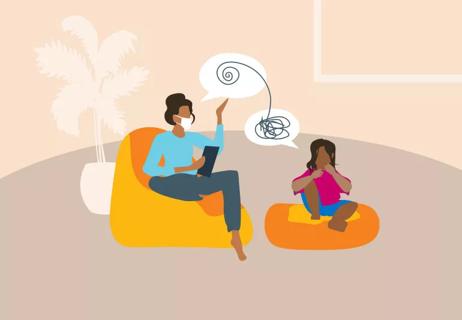American teens are facing unprecedented rates of depression and suicide, but you can be there to support and help them

The United States is in the midst of a national emergency when it comes to teen mental health. Statistics show that teen depression and suicide are on the rise.
Advertisement
Cleveland Clinic is a non-profit academic medical center. Advertising on our site helps support our mission. We do not endorse non-Cleveland Clinic products or services. Policy
According to the Substance Abuse and Mental Health Services Administration (SAMHSA):
Those numbers are bad, but SAMHSA says that the reality is probably even worse. That’s because the young adults surveyed were allowed to answer, “I’m not sure” or “I don’t want to answer.” And SAMHSA is probably right: The U.S. Centers for Disease Control and Prevention (CDC) reports suicide is the second-leading cause of death among American adolescents ages 10 to 14 years old.
“Mental health issues in children and teenagers have been steadily increasing over the last decade or so,” says pediatric psychologist Ethan Benore, PhD. “However, since 2020 — in part because of the pandemic — there’s been a significant increase in teens who are facing mental health difficulties.”
Why is this happening? And what can parents and other adults do to best support the teens in their lives? Dr. Benore helps us look beyond the headlines and statistics to figure it all out.
Advertisement
A CDC study published in 2021 found that more than 4 out of 10 teenagers feel “persistently sad or hopeless.”
While anyone can experience mental health issues, some teens are at higher risk than others. Demographics like race, sexual orientation and family income level can all play a role.
It can be all too easy for adults to forget or downplay how stressful the teen years really are.
“The standard teen experience can be chaotic,” Dr. Benore says. “No one who is depressed wants to feel depressed, but teenagers especially struggle with modifying their emotions.”
At puberty, some parts of teens’ brains are fully developed, like the part responsible for generating emotions — but other functions are still in development, including the ability to manage and regulate those emotions. In other words, teens have big feelings that they can’t always figure out how to deal with.
According to SAMHSA, nearly 30% of U.S. teenagers are receiving some form of mental health help. But for what exactly?
A 2022-2023 survey, The Healthy Minds Study, examined mental health issues among college students. While traditional college students are usually between the ages of 17 and 22, they share many of the same stressors as teenagers. And — unlike many older Americans — most college students experienced the same disruption to their education and social lives that young people did during the COVID-19 crisis.
The survey found that 36% of college students have been diagnosed with anxiety, while 41% have some form of depression. The study also found that self-harm (29%) and eating disorders (14%) were common in the college cohort.
Common stressors on teen and young adult mental health include:
In short, it can be hard to be a teenager even in the best of times — and the last few years haven’t represented the best of times.
In December 2021, U.S. Surgeon General Vivek H. Murthy issued a rare public health advisory warning of a “devastating mental health crisis among American youth” that he said was made worse by COVID-19.
The pandemic isn’t over, but the precautions that kept young people isolated from each other are long gone. Unfortunately, early research suggests that the adversity of those years impacted young people’s biological and psychological development.
“We know children benefit from stability, structure, routine and the support of trusting adults, but during the pandemic, we saw an increase in overall instability and changing structures,” Dr. Benore says. “To this day, we’re seeing an increased volume of children needing a higher level of care.”
Advertisement
Additional factors that impact teen mental health include:
“All of this and more can make our children feel like they’re living in an unsafe world, which can be overwhelming and fatiguing,” Dr. Benore notes. “It can seem hopeless to a young person who’s just starting to understand this larger world.”
Sometimes, warning signs of depression and suicide present themselves suddenly and drastically, while other times, your child just isn’t progressing the way you expect them to — in other words, something just seems off. In particular, look for:
Advertisement
If you’re worried about your teen’s mental health but aren’t quite sure they need help yet, try setting a timeframe. “Tell yourself, ‘I’m not going to wait this out. I’m going to give this two weeks and if I don’t see any improvement, we’re calling the doctor,’” Dr. Benore suggests.
Parents and other caring adults have an important role to play in helping teens through mental health challenges. “Children can and do survive terrible things,” Dr. Benore reassures. “As adults, we can create a path to reduce the suffering they’re experiencing.”
He shares some ways you can try to prevent mental health issues in your kids and how to cope if they do arise.
Don’t underestimate the power of your presence, whether you’re a parent, teacher, coach or other mentor.
“Research shows that the single most common factor for children who develop resilience is having at least one stable and committed relationship with a supportive caregiver or adult,” Dr. Benore states.
This might sound like a no-brainer. You’re thinking, “Of course my child knows I’m here for them!” But kids don’t always feel brave enough to reach out.
“Asking for help is hard,” Dr. Benore recognizes, “so it’s important for caring adults in the child’s life to be there and to offer that help to them.”
Advertisement
When your child opens up to you, put your listening skills to the test.
“These conversations don’t happen through lecturing to your child,” Dr. Benore cautions. “Spend time being quiet and give them an opportunity to process out loud what they’re going through.”
A loving and supportive home life can make or break a child’s mental health. In fact, although lesbian, bisexual, gay or transgender teens are at an especially high risk of depression and suicide, this risk decreases significantly when they have families who support and validate them.
“If their parents can’t see and respect them, it’s difficult for teens to believe they have a chance with others,” Dr. Benore explains. “It’s critical to listen to your child, respect them for who they are and who they’re becoming, and help them feel the love they deserve as they’re growing up.”
Remember all those things you did when you were an expecting or new parent? You probably read tons of books and articles and asked friends for advice. This sort of research should continue as your kids get older, too.
“This is the stage where your child’s social behaviors and emotional function are truly developing, so it’s important, as a parent, to educate yourself about teenagers,” Dr. Benore emphasizes. He recommends the CDC website and professional associations like the American Academy of Pediatrics, along with informal educational resources, like TikTok and YouTube videos from credible medical professionals.
Make sure you’re providing your teen with supportive resources as well. In addition to local services, make sure they’re aware of the following organizations:
If you’re considering therapy for your teen or are just generally concerned about them, start by speaking with your family doctor, with whom you already have a relationship.
“They often have an understanding of your child’s development,” Dr. Benore says. “They also have access to mental health resources and know where to go for the next step.”
It’s understandably upsetting to think that your child is dealing with mental health issues. And parents don’t always feel comfortable asking their kids if they need help. But it’s imperative that you take the lead. “Don’t wait patiently and expect your child to figure it out alone,” Dr. Benore stresses.
You may not even realize what your own actions say to your teen — but they internalize it all. “Your actions speak as loud as whatever you say to your child,” Dr. Benore says.
Eating well, exercising regularly and prioritizing positive social relationships all have an effect on your mental health. And don’t be afraid to talk about feelings (in an age-appropriate manner, of course).
“Let your child see that you also process emotions like fear, anger and sadness,” he adds. “This gives them hope that they can learn to do the same things effectively.”
And be sure to speak positively about seeking help. Sadly, 41% of the college students who participated in the Health Minds Study agreed with the statement “Most people would think less of someone who has received mental health treatment.”
It’s never too early to make conversations about mental health a regular part of your family’s interactions — which makes it a little easier to communicate when your kids are struggling.
“Have regular check-ins or huddles to talk about ups and downs, the good as well as the bad,” Dr. Benore encourages. “When those discussions are ongoing and habitual, it becomes easier to mention a concern, like, ‘Hey, you’re acting differently. What’s up?’ or ‘It looks like you’re sad. What am I missing?’”
To learn more on this topic from Dr. Benore, listen to the Health Essentials Podcast episode, “The Teen Mental Health Crisis.” New episodes of the Health Essentials Podcast publish every Wednesday.
Learn more about our editorial process.
Advertisement

A glass child is the sibling of someone with special needs — often seen as the easy one, but carrying invisible burdens

Appetite changes, social isolation, repetitive behaviors and more may indicate that your child is struggling

Golden children often deal with perfectionism, low self-esteem and strained relationships as adults

Think of this behavior as a role reversal between parent and child — when a child takes on responsibility that’s not developmentally appropriate for their age

Tantrums and meltdowns are normal, but you can help your child manage their bigger emotions

Unexplained injuries, mood changes and sudden isolation may be signs your child needs help

Be involved in your kid’s care, but be mindful of boundaries

Look for comfort, fit and a feeling of partnership

Wearing a scarf, adjusting your outdoor activities and following your asthma treatment plan can help limit breathing problems

Your diet in the weeks, days and hours ahead of your race can power you to the finish line

When someone guilt trips you, they’re using emotionally manipulative behavior to try to get you to act a certain way